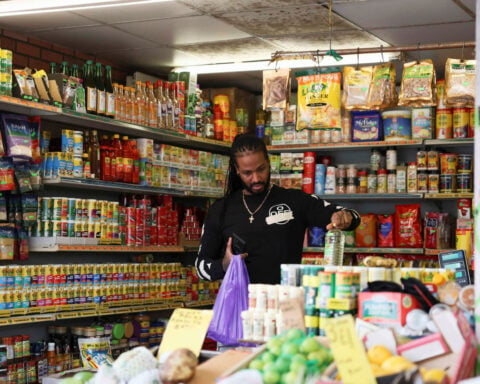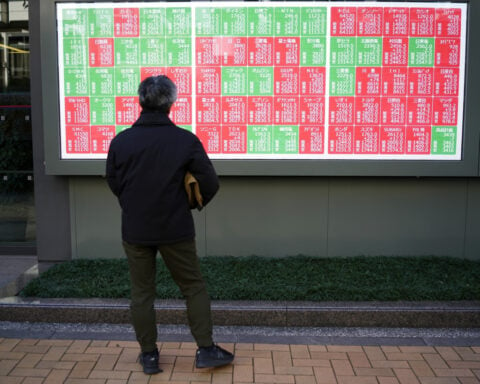By Nell Mackenzie, Carolina Mandl and Summer Zhen
LONDON/NEW YORK/HONG KONG (Reuters) - Attacks in the Red Sea by Iranian-backed Houthi militants on shipping vessels have dealt global supply chains a fresh blow.
The disruption caused to shipping through the Suez Canal, the shortest sea route between Europe and Asia, have squeezed supplies in oil, grain and many other goods.
Five hedge funds shared five ideas on how to trade on the uncertainty. Their views do not represent recommendations or trading positions, which they cannot reveal for regulatory reasons.
1/ CAYLER CAPITAL
* Commodities focused hedge fund
* Size: $54 million
* Founded in 2019
* Key trade: options spread
Cayler Capital founder Brent Belote favours an options trade.
This involves selling a put option spread on December 2024 oil futures, a way of hedging bets if oil fell to a range between $60-$50 a barrel, and simultaneously buying five times as many call options which would pay off if the December contracts hit $120 in 2024.
An option bets an asset will hit a certain value, or strike price.
Belote noted that selling 100 of similar put spreads and buying 500 calls would have earned over $4 million if put on just before Russia's invasion of Ukraine.
For the trade to work, disruption in the Red Sea needs to drain supplies so much that OPEC would be unable to meet the loss, said Belote, referring to the oil-producing group.
"The primary headwind is that OPEC is sitting on a decent chunk of spare capacity through voluntary oil cuts," he said. Otherwise oil would already by above $100, he added.
2/ SVELLAND CAPITAL
* Commodities hedge fund
* Size: around $400 million
* Founded: 2016
* Key trade: Long LNG carriers
Svelland Capital director Nadia Martin Wiggen expects demand for shipping companies carrying liquefied natural gas, which is turned into gas for heating and cooking, to increase long-term.
That's because of increased U.S. production and shipping, a recovery in China demand, India's booming economy, and a greater role for natural gas in the transition to renewable energy, she said.
Red Sea disruptions have pushed up LNG delivery times and the need for more vessels to deliver LNG supplies has increased.
"Despite being an increasingly polarized world, it cannot function without access to energy," said Wiggen.
3/ AUSPICE CAPITAL
* Systematic commodity quant
* Size: $1 billion
* Founded: 2006
* Key trade: long and short several commodities
As a systematic trend follower, Auspice Capital founder Tim Pickering says the fund is increasingly dependent on shorter-term strategies in the absence of clear long-term market direction.
That has meant short bets against grains commodities broadly, among the funds' many long and short positions across energies, metals and commodities.
Red Sea disruptions have pushed up the number of grain cargoes being diverted around Africa, lengthening delivery times and squeezing supplies.
"We expect commodities to tilt higher in general as we progress into 2024," said Pickering.
4/ RAIN TREE PARTNERS
* Equity long/short boutique fund
* Size: undisclosed
* Founded: 2023
* Key trade: Long China shipping and container firms
Co-founder and CEO Gengwei Lin believes Red Sea turmoil should be short-term and has not yet had a huge impact on global supply chains and suppliers.
But because short-term shipping costs have surged, Lin favors exposure to China's large shipping companies.
"China is the world's largest oil importer, it's also the world's largest goods exporter, the crisis is benefiting shipping companies," he said.
The Shanghai Containerized Freight Index, measuring non-contract rates for container shipments out of China's ports, has surged 120% since December. In contrast, the broader Chinese stock market is down almost 7% so far this month.
Lin was also positive on containers, which benefit from the re-routing of vessels.
5/ RIVERPARK FUNDS * Strategies in equities, fixed income and venture capital * Size: $2 billion * Founded: 2006 * Key trade: buy companies facing supply chain issues
RiverPark portfolio manager Conrad van Tienhoven believes the attacks on vessels by Houthi militants are unlikely to last more than 12-18 months.
Given this scenario, he sees opportunities to buy consumer companies that are trading down this year on supply chain worries such as consumer goods and auto makers. Retail brands Nike and Lululemon are down 7.5% and 6% this year, respectively.
Van Tienhoven believes both companies have excess inventory to help deal with short-term logistics issues. He added that automaker Tesla may also become a buying opportunity if it misses one to three production numbers in a row and shares trade down. Tesla shares are down almost 16% this month.
Tesla has said it would temporarily suspend most car production at its factory near Berlin, citing a lack of components given shifts in transport routes linked to the Red Sea disruptions.
The companies did not immediately respond to Reuters' requests for comments.
(Reporting by Nell Mackenzie in London, Carolina Mandl in New York and Summer Shen in Hong Kong; Editing by Dhara Ranasinghe and Nick Zieminski)

 Stock market today: Asian stocks mixed ahead of US inflation data
Stock market today: Asian stocks mixed ahead of US inflation data
 TikTok seeks to reassure U.S. employees ahead of Jan. 19 ban deadline
TikTok seeks to reassure U.S. employees ahead of Jan. 19 ban deadline
 US won't seek charges in unarmed Black motorist Ronald Greene's fatal 2019 arrest
US won't seek charges in unarmed Black motorist Ronald Greene's fatal 2019 arrest
 Euro zone households could increase consumption, ECB chief economist says
Euro zone households could increase consumption, ECB chief economist says
 Foreigners sold South Korean equities last month by most since early 2020
Foreigners sold South Korean equities last month by most since early 2020
 As fires ravage Los Angeles, Tiger Woods isn't sure what will happen with Riviera tournament
As fires ravage Los Angeles, Tiger Woods isn't sure what will happen with Riviera tournament
 Antetokounmpo gets 50th career triple-double as Bucks win 130-115 to end Kings' 7-game win streak
Antetokounmpo gets 50th career triple-double as Bucks win 130-115 to end Kings' 7-game win streak
 No 97 Laura Siegemund upsets Olympic champion Zheng Qinwen at the Australian Open
No 97 Laura Siegemund upsets Olympic champion Zheng Qinwen at the Australian Open








